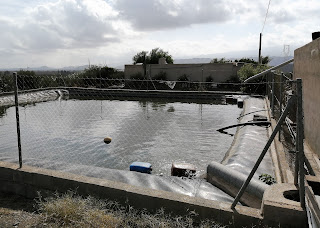I live in an area surrounded by greenhouses.
Plastic ones.
In Almería, and perhaps only counting those invernaderos which cover the dry earth from El Ejido and Dalías east towards Almería City and La Cañada, there are said to be 36,000 hectares of crops growing under plastic. There are more west towards Adra, with the provincial frontier with a small bit of coastal Granada, and on the northern side of Almería; more still around the curiously-named town of Campohermoso (plastic farms are most certainly not hermosos - that's to say: beautiful) located in the campo de Níjar and, back on the coast, as close as they can manage to install them around the attractive natural park of the Cabo de Gata.
An article in the Spanish press calls Almería 'the Orchard of Europe'. It may be thinking more of the olive trees out towards Tabernas and Sorbas, or maybe the lemon tree I've got planted in my garden (you can see it from the street), but our main contribution to the supermarkets of Europe (and even those of the UK when Almería isn't heavily snowed in - at least according to the Daily Express), are the plastic farms, where we grow tomatoes, peppers, cucumbers and melons (and, er, marijuana too).
The number of hectares under plastic in the province hasn't changed in twenty years, which seems unlikely, since new ones are always going up, but there you go.
 |
| View from somewhere above El Ejido taken last week |
The plastic farms are raised on land which is pretty infertile: blasted by the sun and bone-dry. Back in 1960 (lots of photos here), someone figured out that covering the plot with plastic and bringing in the water - generally from underground aquifers, would encourage the plants to grow faster and stronger. It gets very hot inside the invernaderos, and frankly a bit hard to breathe on the days that one sprays with weed-killer or pesticide, but the profits are good, and the workers don't seem to have anything much to say about the conditions.
This is because most of them are either 'undocumented' or registered as migrant workers. Many live in wretched conditions (El Walili, a long-term bidonville in Nijar, was abruptly torched and bulldozed flat recently. It had some 500 residents who were obliged to scatter). Around 98% of the workers in these farms are foreigners says the local union, a number somewhere between forty and fifty thousand, and of course they don't have many rights, and certainly not The Vote (needless to say, the racist Vox party does well in the agricultural sector). A further 30,000 (generally Spanish or at least European), work in the packaging plants or as truckers hauling the produce north.
An article in Público runs details about the labour inspections in the invernaderos and the difficulties of the inspectors in finding who, where and what. According to this, in the last five years, some 11,000 workers have been found to be improperly employed, and the inspectors have handed down around fourteen million euros in fines. Agrodiario on the other hand says that the field-workers are all legal and well paid.
The plastic eventually perishes, and is either lovingly collected and sent to a proper recycling plant, or more likely, discarded in one way or another. An article on Google claims that around 80% of all used plastic ends up either as landfill or simply junked, and another 12% is burned (often in 'accidental' fires). An article at Wiki claims that around 30,000 tons of plastic waste is produced annually. On the bright side, a study by the University of Almería claims that the giant immensity of the plastic actually reduces global warmth - at least locally - by reflecting the sun's heat back into space.
One of the smaller support industries belongs to the bee-breeders. They produce small hives of a few dozen bumble-bees which are then installed within the plastic farms and employed to fertilize the plants. I sometimes find a stray one coming to inspect my lemon tree (they sting like the very devil).
Almería was always a poor and forgotten part of Spain. Now, with its gigantic industry of plastic farms, producing in 2022 a massive 2,787 million euros in sales, it's certainly odd that Vícar and Níjar are the two poorest municipalities in the entire country.
